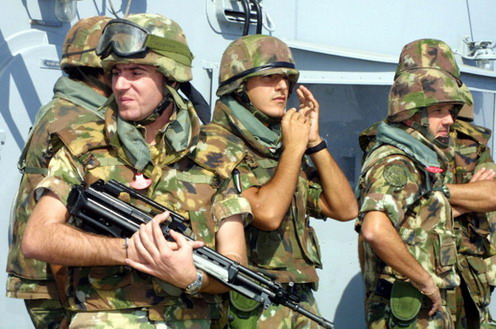The operation which will conclude on 15 March entered the withdrawal phase on 6 February. Deactivation of the Spanish troops has been gradual, with operational capacity maintained up until 24 February. Between 1 and 10 March, 73 members of the Special Operations Force and 17 Spanish Guardia Civil officers will leave Bangui (capital of the CAR) to return home.
The mission has been in operation for 10 months (since May 2014). A total of 197 Spanish military personnel have taken part, deployed in Bangui on two rotations. These forces have completed 447 operations, to which can be added over 150 Spanish Guardia Civil operations that add up to over 100,000 kilometres travelled in the city. In this time, two confrontations took place with local armed personnel but concluded without casualties.
Unstable region
This Spanish deployment was a response to the ongoing instability in the Central African Republic (CAR). In March 2013, President Bozizé was overthrown by Seleka rebels, whose leader - Michel Djotodia - assumed power. However, he was unable to clamp down on the violence perpetrated by the Seleka rebels against the Christian and animist populations, who stood up to him by forming the 'anti-balaka militia groups'.
In October 2013, the UN Secretary-General, Ban Ki-moon, authorised the deployment of a peacekeeping force by the African Union - the Support Mission to the Central African Republic (MISCA). Two months later, France deployed a force of its own under Operation 'Sangaris'.
A serious confrontation occurred between Seleka and anti-Balaka in December 2013, which left nearly 1,000 people dead. Michel Djotodia stepped down in January 2014 and the National Transitional Council appointed Catherine Samba-Panza as President of the CAR, forming a new provisional government.
Against this backdrop, the UN Security Council authorised the deployment of a European Union force on 28 January 2014 (Resolution 2134) aimed at establishing a stable and secure environment to enable transition from MISCA to a new United Nations mission.
EUFOR RCA
The European Union mission was designed as a bridging operation that would conclude in October, six months after reaching full operational capacity. However, the UN extended the operation to March 2015 under Resolution 2181 of October 2014. The operation entered its withdrawal phase on 6 February.
The EUFOR RCA military force deployed in Bangui was formed of 650 military personnel overall, structured into a Multinational Battalion, a Police unit (consisting of members of the French Gendarmerie and the Spanish Guardia Civil), a Special Operations Force and a Joint Multinational Logistics Centre.
The Operation Commander has his General Headquarters in Larissa (Greece) while the Force Commander and his General Headquarters are located in Bangui, with France acting as the framework nation for this operation.
EUFOR RCA has contributed to protecting the population from inter-ethnic conflict and criminal activity; helped establish the conditions to guarantee freedom of movement for civilians and humanitarian organisations; and has facilitated the reactivation of economic activity, as well as the return of displaced people.
Spanish contribution
On 21 March 2014, the Spanish Council of Ministers authorised participation by a Special Operations Force (Spanish acronym: FOE) and a Section of the Spanish Guardia Civil.
An initial Spanish contingent of 50 Special Operations personnel and 25 Guardia Civil officers arrived in Bangui in May 2014. Another ten Spanish military personnel were already deployed at the general headquarters facilities in Larissa and Bangui itself.
After the mission was extended in October, Spain decided to relieve its forces on the ground with a second contingent of 73 Spanish Army personnel and 24 Guardia Civil officers, which joined the six operational military personnel at the General Headquarters of the Operation Force in Bangui.
The Spanish forces deployed in CAR between 2014 and 2015 have made a significant contribution to improving the situation in this region. The Special Operations Force undertook reconnaissance missions by day and night, which enabled a precise assessment of the environment to be acquired as an essential tool in this type of operation.
Contact was maintained with various local leaders and permanent detachments were established in the third district of the capital, which improved understanding between the population and EUFOR forces, and increased the level of security and stability in the area. All this facilitated the return of those displaced from the various camps located in the capital.
The Spanish Guardia Civil provided citizen security services in the third and fifth districts of the capital, specifically and in a joint fashion together with patrols carried out by internal CAR security forces, with whom the Spanish officers carried out mentoring activities.
As from 15 March, only one contingent of eight Guardia Civil officers will remain in Bangui as part of MINUSCA.





